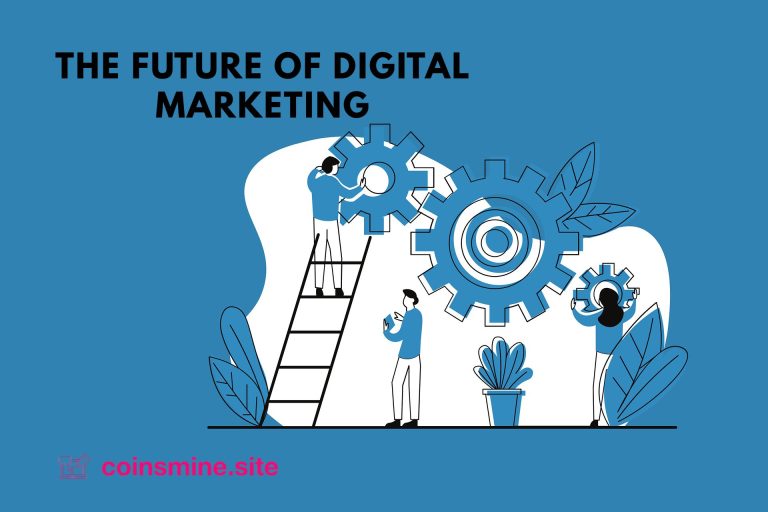The Future of Digital Marketing: Conventional techniques are being replaced by more intelligent, data-informed approaches leveraging artificial intelligence, automation, and individualized experiences. As companies strive to capture attention in a busier online environment, it is crucial to anticipate the direction of digital marketing’s future.
With advancements in voice and visual search, the importance of ethical data utilization, and the rise of immersive content, marketers need to evolve to remain pertinent. This article will examine the significant trends influencing the future of digital marketing and the ways brands can gear up for what lies ahead.
The Future of Digital Marketing
Digital marketing has undergone swift changes in the last ten years, transitioning from simple banner advertisements and keyword overload to an advanced, data-focused environment. As we gaze into the future, numerous trends are set to continue altering the scene.
(1) Artificial Intelligence (AI) and Automation.
Artificial intelligence has evolved from a concept seen in the future to a crucial component of modern digital marketing. Through the use of chatbots, predictive analytics, tailored suggestions, and automated email initiatives, AI enables brands to provide more intelligent, rapid, and pertinent experiences to their audience. Instruments such as ChatGPT and AI-enhanced search updates from Google are already transforming the ways in which content is produced and engaged with.
In the future, we can anticipate a more profound incorporation of AI in marketing. For instance, highly personalized advertising targeting, automated A/B testing, and smart content creation will become commonplace. Marketers who effectively utilize AI will gain a considerable advantage in customer interaction and return on investment.
(2) Voice and Visual Search.
As smart assistants such as Alexa, Siri, and Google Assistant become more prevalent, voice search is increasingly gaining traction. At the same time, visual search, which enables users to search using images rather than text, is becoming more popular on platforms like Google Lens and Pinterest.
To get ready for this transformation, digital marketers must enhance their content for both conversational queries and image recognition. This means incorporating more natural language keywords and offering comprehensive metadata for images. Companies that adjust to these evolving search habits will increase their visibility in the future.
(3) Video and Interactive Content.
Video continues to be one of the most captivating content types, and its popularity is on the rise. Audiences favor brief, visually appealing content, and marketers need to adapt to this preference.
In the coming years, we can expect an increase in interactive content, including polls, quizzes, 360° videos, and augmented reality (AR), to boost engagement. Interactive advertisements will not only capture interest but also facilitate improved data gathering and customer insights.
(4) Data Privacy and Ethical Marketing.
Given the growing worries regarding data privacy, particularly following rules such as GDPR and CCPA, digital marketers are required to adopt more transparent and ethical approaches in their methods. The elimination of third-party cookies is prompting businesses to seek alternative methods for gathering and utilizing customer data.
Data obtained directly from customers, known as first-party data, will be increasingly important. To earn customer trust, marketers must be transparent about their data collection and usage practices while providing genuine value in return for customer information.
(5) The Rise of Influencer and Creator Marketing.
Influencer marketing is transforming into a more genuine, specifically targeted strategy. Instead of collaborating with stars, brands are achieving greater success by working with micro- and nano-influencers who possess smaller yet more engaged followings.
In the future, brands will prioritize building enduring partnerships with content creators and ambassadors. These collaborations will emphasize storytelling and authentic alignment with the brand instead of merely financial endorsements.
(6) Omnichannel Experience and Customer Journey Optimization.
Customers today engage with brands through various channels, including websites, applications, social platforms, email, and even smart devices. The upcoming trends in digital marketing will focus on delivering smooth and integrated experiences across all these points of interaction.
This indicates a closer integration among platforms and a more profound comprehension of the customer journey. Instruments such as customer journey mapping, CRM integration, and cross-platform analytics will be essential in providing a unified and tailored brand experience.
Conclusion.
The realm of digital marketing is changing quickly, marked by the use of data and an emphasis on tailored experiences. As artificial intelligence continues to advance, consumer habits shift, and there is a heightened focus on ethics and tailored experiences, the methods by which brands engage with their audiences are changing. Companies that adapt to these developments, allocate resources to the appropriate technologies, and emphasize customer experience will find themselves in the strongest position for success in the changing digital environment.



